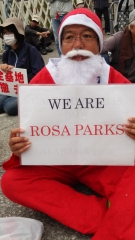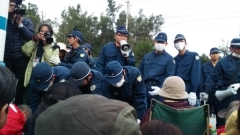23 January 2016
Being Rosa Parks at US Marine Camp Schwab in Okinawa
From last December to beginning of this month, I was in Okinawa to join protest activities of locals who are opposed to construction of new military base runways in US Marine Camp Schwab in Nago city, Okinawa.
Why we are opposed has been described in this blog for years. Please read the posts clicking the tag Okinawa.
Especially, this article gives you outline of what is going on there. My letter to US Ambassador to Japan, Caroline Kennedy, daughter of JFK.
While I joined the protest, I used picket board that says "We are Rosa Parks."
Rosa Parks as you may know, is the symbol of refusal to unjust matters. A Black woman who refused to give front seat to white passengers in a bus and was arrested in Montgomery, Alabama, 1955. But her action sparked bus boycott protest led by Dr. Martin Luther King. 9 years later, civil rights Act was passed. A year after that, Dr. King led peaceful march from Selma to Montgomery to call for enactment of voting rights bill. Black people in the Southern states were blocked at voting registration office.
What surprised me was marines reaction to the picket board. Young marines looked positive. I asked one security guard, who was a young white man inside the camp premise, if he knew what it meant. He said smilingly "I know what it means." One Black man driving a car looked at me, smiled and gestured his support. "Rosa Parks" is known to every American.
I saw the movie, "SELMA" after I got back home in Tokyo. It was a great movie. I found how hard it was for him to do this. A lot of people were hurt and even killed. But he and his followers never gave in.
Interesting thing to know was Dr. King was a very smart man so that he once retreated the march to avoid bloodshed by local police. He filed lawsuit against the Alabama state that bans peaceful march. Then the court made an order to allow the march. He prevailed.
Just like Rosa Parks and Dr. King. we did peaceful protest at the gate of Camp Schwab. Sit-in-protest at the gate that construction vehicles passed through.
Police came and took us from the gate. We never foughtback but just kept sitting down on the ground. I was carried by the police from shoulders to toes.
Protestants do every day. It has been going on for years. There were several injuries and arrests. But we still keep doing this. We cannot stop the construction but at least we are delaying that. We will never give in.
While I joined in the sit-in protest, I really felt like Rosa Parks, Dr. King and their followers in their times. We may be backed up by their souls.
Thank you, Dr. King and Ms. Rosa Parks. I am proud of being part of this protest activity.
The US government should hear the voice of protestants and halt such stupid construction project. It is as stupid as segregation laws. It is actually what is happening in your own yard.
15:28 Posted in Ecology, Film, Japan News, Politics, Society, US-Japan relationship, USA issues | Permalink | Comments (0) | Tags: history, military, okinawa, racism, afro-american
07 October 2012
Film"The Help" and "Precious" Elegant & Rich Whites and Vulgar & Poor Blacks
Two films are stories about Afro-Americans in the U.S. Both of them described hard situations that Black people had experienced in the past and maybe even now.
"The Help" was a story of Afro-American maids working for white families in Mississippi in 1960's when segregation was very common. Afro-American maids were not allowed to share bathroom with white family members. They had to always put up with white people's arrogance. A young white writer decided to write about their experience and publish that by interviewing them.
"Precious" was about a girl of the same name living in Harlem, New York, 1980's. She got two babies with her father. She was raped since she was a child. Her mother abused her because of pregnancy. Her mother and she lived on welfare. She had to stop attending middle school for pregnancy. So she had to attend special school for dropped outs.
Portrayals of Black people in the both films are kind of, from white perspective although Afro-American characters played important roles. They spoke grammatically incorrect English like "You is smart." They looked uneducated, vulgar and violent, wheras white or lighter skin characters looked elegant, educated and kind. That reflects on reality? Maybe or maybe not.
For white viewers such kind of films satisfy their supremacy and ease frustration caused by forcible integration.
Has America changed since Civil Rights Act?
Mr. Obama is the president of the U.S. He is half-white and not descendant of slaves. If he was a pure Afro-American of slave descendant, he would have never been elected. He wasn't popular in the Southern States even among Democrats. Because he was elected, since his inauguration, number of Racist activist group has drastically increased.
Most recent survey for income gap among racial groups found Black and white gap recorded biggest since 1984 when the survey was first conducted. It was due to recession but why the burden biased to Afro-Americans? Racism? Poverty and lack of education caused by racial discrimination.
I don't like this part of America but this is reality of America.
22:54 Posted in Film, Media, Society | Permalink | Comments (0) | Tags: racism, afro-american, history, poverty
12 February 2012
Shocked and Sad to hear Whitney Houston's death
What happened to her? She was only at the age of 48.
She was a big star for me since I was in high school. My most favorite song was "I want to dance with somebody" and "Love is a contact sport."
In 1988 and 1989, I went to her rock concert held in Fukuoka where I used to live.
I enjoyed the concert very much. From a far away seat, I could notice her tall and slender figure. Her voice was just beautiful. When the words like "I love you" was heard from the spectators, she responded by saying "I LOVE YOU, too" and "I wish I could speak Japanese."
I remember what she said in the interview with Japanese music magazine at that time.
"I cannot be an actress in America because I am Black woman. There is no offer for Black woman."
But later she made her successful actress in the movie "Bodyguard" co-starring with Kevin Costner.
In that film she not only did great act but she sang great songs with great voice.
I can no longer hear her singing, dancing and acting. That is so sad to know.
Gomeifuku-wo-oinorishimasu (Japanese way of praying for the dead people with respect. Literary it means "I pray for the happiness in the heaven.")
13:09 Posted in Music | Permalink | Comments (0) | Tags: afro-american
19 November 2011
Film "Mississippi Burning" and President Obama
The story is one Afro-American civil activist disappeared somewhere in Missippi 1964 and FBI men searched for them. Then they faced brutality of local people. The film described how uncivilized and scary deep South like Mississippi was.
I remember when I was in America, Afro-American professor of Black Studies criticized the film because the main characters were two good white men saving poor Afro-Americans. In fact, the film was made from white people's perspective.
When we, Japanese hear about Mississippi, first thing to come up is "The Adventures of Tom Sawyer" by Mark Twain. But reality is racist conservative deep South. Now things have changed a little bit better, I guess.
America has changed since that time, which was proven by the fact that Obama was elected as President. However, it seemed he dissappointed those who voted for him. His supporters believed Obama can understand pain of the poor people because he shared the same experience. After he was elected, what appears to be was he was after all, American President just like other Presidents, who had different skin color. He had to serve for rich white men who dominate the country's wealth. He had to keep sending troops to the battle fields to save America's pride and military industry.
The consequence is "Occupy Wall Street." Now new type of seggregation emerged in a country of democracy and freedom. The rich and the poor.
Agony goes on as life goes on.
23:38 Posted in Film, Politics, Society, USA issues | Permalink | Comments (0) | Tags: racism, afro-american, class gap







